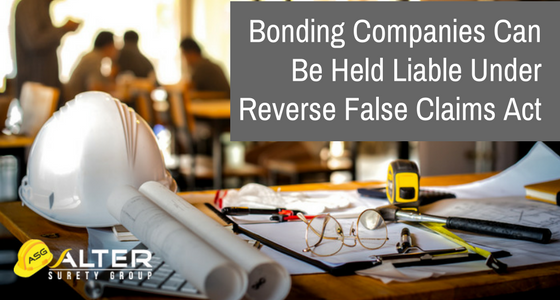If you’re involved with Federal construction projects and government set-aside programs like SDVOSB, know that your bonding company may ask a few more questions.
On July 31, 2017, the U.S. District Court for the District of Columbia issued a ruling in a reverse False Claims Act case that says bonding companies can be held liable for treble damages if they issue surety bonds to companies that try to defraud the government by falsely claiming to be a Service-Disabled Veteran-Owned Small Business (SDVOSB).
The Veterans Benefits Act of 2003 established a procurement program that allows federal contracts to restrict bid competition and award these set-aside contracts exclusively to small businesses that meet specific criteria, as in the case of SDVOSBs. Given that the government has exceeded its Federal contract goals for SDVOSBs four years in a row with $13.8 billion in small business contracts awarded, it’s easy to see why some contractors might be tempted to falsify their SDVOSB or other small business program status to get a piece of the action.
Which is what allegedly took place in the case of United States ex. rel. Scollick v. Narula. The construction company defendants are accused of setting up a shell SDVOSB company that was actually owned by non-Veterans to get access to the bid and contract.
But it’s the ruling involving the bonding company defendants that really shakes things up here. The court agreed with the whistleblower plaintiff that the bonding companies that provided surety bonds to the construction company knew or should have known that the contractor fraudulently claimed to be a SDVOSB and, by providing the bonds, advanced the fraud. Two pieces of underlying legislation are important to the issue at hand and the ruling.
The Miller Act requires all government construction contractors to post bonds guaranteeing performance according to the terms of the contract. The contract in this case specified that the construction company had to be an SDVOSB.
Section 3729(a)(1)(G) of the False Claims Act, known as the reverse False Claims Act section, provides for liability where someone hides facts or makes false statements not for the purpose of obtaining money from the government, but to avoid paying money to the government that would have otherwise been due.
The court declared that the government, even though it didn’t suffer financial loss, still incurred loss because the construction company looked to participate in and receive payment under programs that were supposed to benefit third parties – in this case SDVOSB set-aside contracts – rather than the government itself. Therefore, the government did not receive value and all payments made are recoverable as damages.
And, the court ruled that facts were sufficient to show that the insurance defendants allegedly knew that the construction company hid facts and falsified documents about the true nature of its ownership, management and employees when they issued surety bonds to a contractor that was fraudulently invoicing for work performed as an SDVOSB. It may appear that the bonding company covered up the fact that the contract was fraudulent, thereby avoiding having to pay out on a failure to perform.
Bottom line: SDVOSB fraud is a serious issue. Sureties obviously want to work with financially stable contractors that adhere to good business practices under acceptable risk limits. With this recent court ruling, sureties have the added incentive to extend due diligence when issuing surety bonds on government set-aside contracts, as they can be held liable for treble damages (up to three times the amount of the bond) if the contract is proved to be fraudulent. This may be a step in the right direction towards holding down SDVOSB fraud. If you have any questions about bonding requirements on government small business contracts, contact the professionals at Alter Surety Group at (305) 517-3803 or visit www.altersurety.com.

